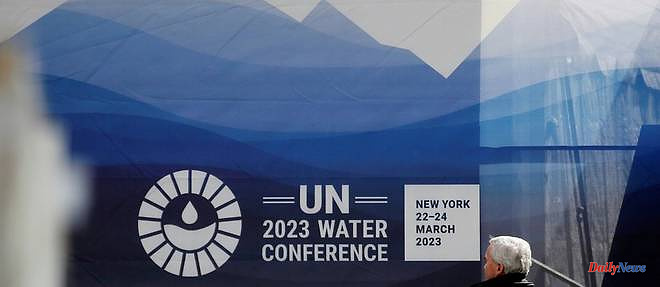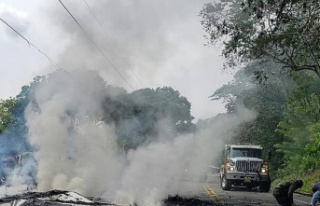'Vampiric' humanity has 'broken the water cycle', endangering billions of people across the planet, the UN secretary-general denounced on Wednesday at the opening of the first UN conference on the water for nearly half a century.
"We have broken the water cycle, destroyed ecosystems and contaminated groundwater", launched Antonio Guterres at the opening of these three days which should welcome more than 6,500 participants including a hundred ministers and a dozen heads. of state and government.
“We are draining humanity of its vital substance through our vampiric overconsumption and unsustainable use of water, and we are causing it to evaporate by warming the planet,” he added, worrying about the "compromised" future of water, yet "the lifeblood of humanity" and "a human right".
Not enough water in places, too much in others where flooding is increasing, or contaminated water: if dramatic situations are legion in many places on the planet, a report by UN-Water and Unesco published on Tuesday underlines the "imminent risk of a global water crisis".
"If nothing is done, between 40 and 50% of the population will continue to lack access to sanitation services and around 20-25% to drinking water," the author told AFP. Principal Richard Connor.
And if the percentages do not change, the world's population grows and the number of people affected with it.
So the UN conference, the first of this magnitude since 1977 on this vital but too long ignored issue, raises a lot of expectations to hope to guarantee by 2030 access for all to drinking water or to toilets, targets set in 2015.
The participants, States, companies or representatives of civil society, were called upon to come up with concrete commitments, some of which had already been announced in advance.
But already, some observers doubt their scope and the availability of the necessary funding to implement them.
For WWF's Stuart Orr, "we can build resilient societies and economies if governments and businesses quickly put in place policies, practices and investments that recognize, and restore, the full value of healthy rivers, lakes and wetlands. health".
While freshwater use has increased by nearly 1% per year over the past 40 years, the UN-Water report first highlights water shortages that "are becoming more widespread " and to worsen with the impact of global warming, until soon to hit even the regions today spared in East Asia or South America.
Thus, approximately 10% of the world's population lives in a country where water stress is high or critical. And according to the report by UN climate experts (IPCC) published on Monday, "about half of the world's population" suffers from "severe" water shortages for at least part of the year.
A situation that also highlights inequalities. "Wherever you are, if you are rich enough, you will manage to have water", underlined Richard Connor.
And women and girls "are disproportionately affected," actor Matt Damon, co-founder of the NGO Water.org, insisted on Wednesday. "Millions of girls are out of school because they have to fetch water."
The problem is not only the lack of water, but the contamination of what may be available, due to the absence or deficiencies of sanitation systems.
At least two billion people drink water contaminated with faeces, exposing them to deadly diseases, cholera, dysentery, typhoid or polio.
To ensure access to drinking water for all by 2030, current levels of investment should be multiplied by at least three, estimates UN-Water.
“Everything we need to live a decent life is directly linked to water, our health, food, habitats, economy, infrastructure and climate,” King Willem-Alexander of the Countries insisted on Wednesday. -Bas, co-chair of the conference with the President of Tajikistan.
But as with the fight against climate change, the poorest countries on the planet do not have the means to do it alone.
"We must build infrastructures adapted to a new world where storms are more frequent and more violent", in particular to store and treat water on islands where the intrusion of the sea into underground reserves is increasingly problematic , underlined Kausea Natano, Prime Minister of Tuvalu.
So "we need support, through partnerships, international cooperation, funding and technology transfer", he pleaded on behalf of the Pacific island states.
22/03/2023 18:50:43 - United Nations (United States) (AFP) - © 2023 AFP












